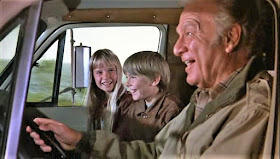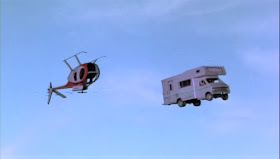Me: Maybe they had an emergency in the kitchen?
Me: No … well, at least we’ve had some time to peruse the menu.
Me: Okay, I know. Anything look good to you?
Me: I don’t know … I always feel weird ordering spaghetti in a restaurant.
Me: I don’t know … it’s such a basic thing, isn’t it? I feel like I could throw together a spaghetti dinner myself without much fuss. Why waste a night out?
Me: I suppose not.
Me: Yeah, maybe - but I wouldn't. Anyway, I’m not convinced this is a “real Italian restaurant,” to be honest.
Me: I don’t think the staff is Italian.
Me: Yeah, but that chef ...
Me: Yeah. He didn’t sound Italian. He sounded like Mr. Smee putting on a bad accent. “Joe” isn’t even an Italian name, is it?
Me: White Rabbit?
Me: Oh, right.
…
Me: So?
Me: <sighs heavily> I don’t know …
Me: <groans> I know, I know …
Me: It’s just … there’s so much else to talk about …
Me: … and I feel like all I do any more is complain. There’s so much good stuff going on …
Me: Yes, exactly. Can’t we talk about that?
Me: …
Me: "Well” what?
Me: I … there’s a … look, it’s not like I don’t want to …
Me: … it’s just … I don't know. They've been making animated movies for 18 years by this point, right?
Me: So does it even need to be pointed out that it looks great? Shouldn't that be a given?
Me: … Well, that's true. You could tell they weren't used to it: some of the close-up's are framed weird.
Me: Hey, no need to patronize me. I don't need help reviewing a Disney movie by this point.
Me: Yes, really. Why the sarcasm?
Me: I know, I know.
Me: It's not just the cats. The cat thing I was prepared for. But there's more …
Me: I didn't really want to get into this already …
Me: … I thought it could wait until Cinderella, or Alice in Wonderland …
Me: The … look, they made five animated movies in the '50's. I've never been crazy about most of them.
Me: Yeah, yeah … Cinderella saved the animation studio, people love Alice in Wonderland and Peter Pan. I used to think Lady and The Tramp was one of Disney's better films …
Me: I've always liked Sleeping Beauty. I still do. It's like the studio built up enough comfort food points over the decade to try something overtly artistic, and it bit Walt in the ass. After that he focused on Disneyland and let the animation studio go into a creative tailspin in the '60s.
Me: I really can't ... it's just that after seeing so many of their movies from the '40s …
Me: Yeah - the ones no one seems to like and Disney itself wants to ignore …
Me: They were … even when they weren't good, like the "Bongo" half of Fun and Fancy Free, or most of Melody Time … at least they were interesting.
Me: Isn't it intrinsically better that they were trying new things out instead of going with what people wanted to see? I mean, The Adventures of Ichabod and Mr. Toad is mostly great, and The Three Caballeros is fantastic …
Me: Fine, fine. But the thing is these ones from the '50s that everyone loves … they're just so …
Me: Yes. They're so safe, and predictable … it's frustrating.
Me: I've felt that way for a while. But now there's more to it … it’s like a perspective thing, you know?
Me: It’s just all so … I don't know. Middle class?
Me: Yes, yes.
Me: <sighs> That wasn't always the case, though. You can still tell by how different something like Fantasia is from Peter Pan, or how Swiss Family Robinson is different from The Island at the Top of the World.
Me: Obviously. It's just tougher to get through some era's than others. The creativity seems to ebb and flow like crazy. It's hard to keep a continuous line of criticism going when things are all over the place.
Me: <rubbing head in hands> Christ, I know. It’s just … it’s different, now.
Me: Who … who says that?
Me: <shrugs>
…
Me: I haven’t even seen anyone since we got our drinks. I’m starving.
Me: Not to mention breadsticks. I’ll … we’ll give them a few more minutes.
…
Me: Now that’s not fair. I mean, yes, but … but that’s what I do.
Me: “Does it matter?” Well, I don’t know. Does anything?
Me: And … and sometimes it’s just easier to ignore the bad things when everything else is good …
Me: I'd always enjoyed Lady and The Tramp before - even with the stupid dated "herro kitty" routine. But now it's … I don’t know. I’m sorry.
Me: But I feel like I do.
Me: I’m a … well, not apologize, but … I feel like I should …
Me: I’m not sure … be ashamed?
Me: Or something ... guilty! That’s it! I feel guilty.
Me: For … well, it’s … it’s hard to say …
Me: I guess ... I guess I feel like I should point things out because I feel guilty. I don't know why, I just do.
Me: Besides ... there’s a … a precedent now.
Me: Yes.
Me: Well … it’s not like I can ignore what I've said before.
Me: I very well can’t chide something one week and then ignore the same problem thereafter.
Me: “Why not?” Are you suggesting I change my methods?
Me: <sighs> I know. But even ignoring the cats, and the bad Italian, and the myriad of other horrendous accents, it's not like this is a great love story.
Me: No, of course not. I wasn't even expecting All That Heaven Allows. It's just that when your central story gets overshadowed by pantomime Fu Manchu cats or barbershop dog-howling, you've got problems.
Me: <shakes head> It's ... this was the first time I've watched this movie and could honestly care less about what was going on. I got -zero- entertainment value, absolutely no pleasure while watching.
Me: <nods> I wasn't expecting that. I feel like I'm subconsciously rebelling against the status quo.
Me: Like you said, tastes change. I don't know ... when I get more pleasure from watching Jonathan Winters make an ass of himself in some shit TV special than I do watching a certified classic ... maybe the problem's with me?
Me: <nods> It's not the first time I've called out something beloved a piece of crap - and it won't be the last.
Me: ... yes.
Me: I am, and I will always be. Lady and The Tramp smells like wet dog. There, I said it.
Me: <shrugs> Well ... I have to be honest. What else can I do?
…
Me: You know, this is ridiculous. No one's been to our table. I’m going back there to find out what the hell’s going on.
Me: <gets up and walks out>
…
…
Me: <returns> Holy shit!
Me: They … they’re serving dogs!
Me: No, no! They’re serving them dinner!
Me: They’ve dropped everything, set up a little table in the back alley, and they're serving spaghetti and meatballs to a pair of strays.
Me: Joe and the owner are singing to them. Like it’s a goddamned date night for dogs out there!
Me: I know! This is ridic … wait, where are the others?
Me: <sighs> I guess you’re right. I can’t stomach this place anymore.
Me: It’s Thai - you mean Thai food.
Me: <hesitates at the door> It’s just … I keep coming back here … it’s where I am … I can’t seem to leave … I’ll probably just stay here …

















